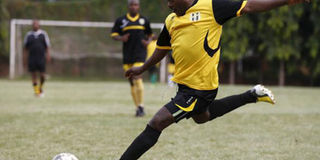Nkurunziza: A man of many feats

President Nkurunziza plays as a striker and scores regularly. He is a qualified football coach and also owner of Hallelujah Football Club. Net photo
Last week when pictures of President Pierre Nkurunziza playing football went online, many wondered how he could make time to dribble the ball barely weeks after an attempted coup.
What most people do not realise is that for President Nkurunziza, football is not a one-off event. It is his passion.
He is a striker and regular scorer. And when his team-Hallelujah is playing, he sometimes captains.
Pierre the striker
In 2009, during a friendly match between Ugandan members of Parliament and Burundian cabinet in Bujumbura, he played as a winger and scored twice.
It is also not a surprise to find him with a spade and a hoe mixing sand and cement at a school or hospital construction site. It is his simplicity that has endeared him to people.
His love for farming especially planting fruits and sometimes joining farmers in the gardens has become his other feat.
The social worker
In 2009, accompanied by Pastor Robert Kayanja of Rubaga Miracle Center, who is his close friend, he spent two hours working with builders at a school construction site in Babunza north east of Burundi.
Dressed in gumboots, jeans, T-shirt and a cap, he lifted and poured about 15 basins of concrete in the foundation as his supporters danced and sung praises for him.
The soft spoken president told people who had gathered to witness the launch of the $300,000 (about Shs900m) school project that it’s through education that Burundi would be transformed.
“It is social services like education that will transform Burundi. Our government will do whatever is necessary to educate our children,” he said.
Security detail
Unlike some presidents who are always heavily guarded with amoured personnel carriers, Nkurunziza moves in a convoy of less than 10 vehicles.
Even his bodyguards are not as strict as President Museveni’s who make sure there are security rings around him when he is meeting people or addressing a rally.
At the launch of that school project, members of Pastor Kayanja’s entourage would freely mingle with him.
Religion
The father of five is a devoted born again Christian and a football fan and a player. He owns a football team-- Hallelujah which reflects his love for Christianity.
He attends and preaches at conferences in and outside Bujumbura.
This does not mean he takes his security for granted. In 2007, in the middle of prayers at a Christian conference at a stadium in Bujumbura, with his hands raised up, a pistol was spotted stashed in his waist.
But for most people, it is his passion for God that endears him to them. “He knows it’s God who made him what he is today. That’s why he lives a simple life.
“He is a strong believer in Jesus,” says Louis Ngabire, 67, a Burundian with children living in Uganda.
It is probably his love for prayer and influence that you will find Burundian troops in Somalia holding lunch time and evening prayers.
Even at the frontline, Burundian troops will have lunch time prayers. In 2009, al-Shabaab attacked a makeshift church during Sunday prayers and killed 11 Burundians.
Background
Born in 1963 in Burundi’s capital, Bujumbura, President Nkurunziza attended primary and secondary education in Ngozi, his home village, where he was recently holed up for days after secretly entering the country following a coup attempt against him.
His father, Eustache Ngabisha was killed when he was nine in ethnic violence that claimed 400,000 Burundians and many went into exile.
According to Nkurunziza’s biography, Ngabisha had been elected to the parliament of Burundi in 1965 and later as governor before his tragic death.
In his family, it’s not only his father who was killed in ethnic violence. His other five siblings were also killed during civil war that started in 1993. In the family of seven, he and his sister are the only ones living.
It’s the killing of his family members and several attempts on his life that forced Nkurunziza to join politics and later become a rebel to fight Tutsi domination.
He was a lecturer in 1993 at Burundi University when civil war broke out following assassination of the first -elected Hutu president Mechior Ndadaye.
Two years later, soldiers attacked the university and attempted to kill him.
He was quoted in 2004 in interview with the UN humanitarian news agency taking about the attack on the university that became a turning point in his life.
Turning point
“In 1995, the Tutsi army attacked the campus and killed 200 students. They tried to kill me too. The attackers shot at my car but I got out and ran away. They torched my car. I then joined the CNDD-FDD as a soldier. This war was forced on us; we did not start It.” he said.
From a lecturer to a rebel, and abandoning chalk to use a gun, was t a survival move.
His rebel group was accused of atrocities and carrying out ambushes along the main roads and killing travellers especially the Tutsi. In 1998, a Burundian court sentenced him to death in absentia for the alleged atrocities.
As a learned rebel, he rose through the ranks in 1998 to be become secretary-general of the CNDD-FDD, and in 2001 following a schism in their group, he overthrew his boss, Jean-Bosco Ndayikengurukuye.
Rise to the top
Internal elections were held later in the same year and Nkurunziza retained the chair.
Although Nkurunziza’s critics say the elections were not free and fair, his supporters say he was popular within the movement because of his humility and character.
“He was the only leader who was liked by both conservatives and liberals within the movement.
“That’s why he was elected to replace Ndayikengurukuye,” says Jean Dodo, a Burundian businessman who was a member of CNDD, now living in Uganda.
Dodo, says in 2004, when Nkurunziza was appointed a minister in the transitional government of Domitien Ndayizeye, some CNDD-FDD members felt he had betrayed them.
President Museveni, deputized by then South African Vice President now, President Jacob Zuma, chaired the Great Lakes Regional Initiative on Burundi that brought warring parties to sign the agreement that ended a seven-year war.
In 2005, the rebel outfit became a political party which saw Nkurunziza nod nominated as the party’s presidential candidate.
The bigger problem
According to his biography, Nkurunziza was elected president unopposed by parliament on 19 August 2005.
He inherited a country that was divided and devastated by the civil and bad leadership. Poverty, ethnic tension and corruption still remain big challenges.
But, President Nkurunziza has not only worked hard to reconcile the Burundians, he has also pushed economic recovery policies that seen Economy grow from $1.5b in 2005 to $3b, World Bank statistics show.
According the International Monitory Fund figures, the economy has been growing at the rate of four per cent since 2009.
Nkurunziza will have to work harder and pray more to keep Burundians united.
However, a divided army, and mounting pressure from the international community may bog down Nkurunziza’s efforts for recovery and reconciliation in Burundi.
Timeline
December 18, 1963. Pierre Nkurunziza was born in Bujumbura
1965. His father, Eustache Ngabish,a becomes an MP and later a governor in 1969. He is killed in 1972.
1988. He graduated from the University of Burundi with a degree in sports education.
1993. He became a lecturer at Burundi University
1995. He joined CNDD-FDD as a rebel after an attempt on his life at the university by government soldiers.
1998. He became the secretary general of CNDD-FDD only to overthrow his boss in 2001
2004. He is appointed a minister for Good Governance in the transitional government.
2005. He is elected president in 2005 by parliament (through an electoral college)
2007. He sends Burundian troops to Somalia under the auspices of African Union Mission in Somalia
August 2009. While in Nairobi, Nkurunziza was awarded the Model Leader for a New Africa Award by African Forum on Religion and Government, a Florida-based religious organisation. He is the first African President to be awarded with such a distinction on the continent.
2010. He seeks re-election and wins
March 2014. Nkurunziza bans jogging due to fears it was being used as a cover for subversion.
2015. His nomination for a third-term, sparked off demonstrations in Bujumbura.




